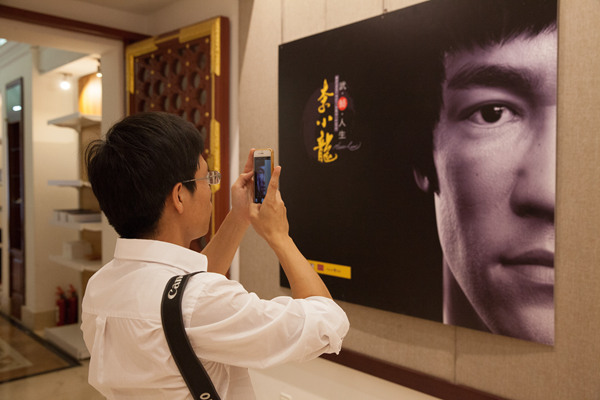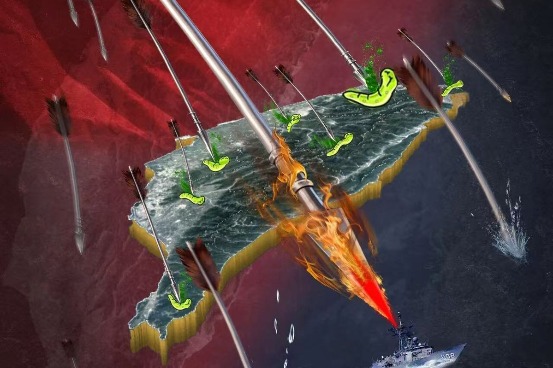Bruce Lee's broad appeal still holds


It's a reflection of Bruce Lee's transcendent appeal that he continues to inspire people on both sides of the Pacific Ocean even 46 years after his untimely death. The United States, the Chinese mainland and Hong Kong were central to his powerful hybrid identity. In many ways, Bruce Lee is a man of the moment, a man for the paradoxical times we live in. As a fighter on and off the screen, he knew a thing or two about conflict: when to stand up, when to stand down, when to walk away.
In the 1960s he was a first-generation jetsetter, bridging the Pacific Ocean at a time when jets had just begun to edge out the older, slow propeller planes for long-haul travel. As a Chinese living in the US, and as an American living in Hong Kong, he epitomized the integrated "Chimerica" complex we live in today. A bicultural exemplar, he beat a path from Hollywood to Hong Kong and back, bringing American technique to Chinese films, and the practice and philosophy of Chinese martial arts to US screens, fight clubs and gyms.
He inspired Chinese, still uncertain of their place in an inequitable world, to be proud of themselves, but at the same time, he also inspired people of all races with his inclusive teaching and accessible presentation of traditional Chinese wisdom.
The quibbling, quarreling world today is in dire need of the kind of rounded, yin-yang wisdom epitomized by Lee in his prime, whether in regard to racial harmony, the US-China trade war, or the violent protests in Hong Kong.
Lee is best remembered as a rugged individual, a man of uncanny self-confidence whose passion for the martial arts and spiritual self-mastery was evident to all who knew him.
When American film director Quentin Tarantino took to the screen to poke fun at Bruce Lee by mocking his personality and martial arts prowess in Once Upon a Time in Hollywood, the reaction of fans, family, friends, former sparring partners and film boards was swift and furious.
Kareem Abdul Jabbar, a former student of Lee and a legend in his own right, wrote a nuanced commentary in which he defended the right of Tarantino to invent, exaggerate and distort the truth in the name of art, but also said, emphatically, that propagating deliberate lies and deceptive depictions of real people is not just in bad taste, but puts a blur on the historical record.
Bruce Lee as played by Mike Moh is creditable as far as these things go; there's an uncanny resemblance and he got the accent down. True, the fists flew much too slowly to be vintage Lee, and Brad Pitt's counterattack was even more implausible, but that's pretty much par for the course in Hollywood.
What critics of the film took offense to was the plot. The director used Lee as a chump and disposable sidekick to a charming Caucasian lead. As Lee's daughter Shannon explained in Variety magazine, her father was forever being "marginalized and treated like a kind of a nuisance of a human being by white Hollywood, which is how he's treated in the film".
Now, Lee's name is being invoked by the violent protesters in Hong Kong. Consider these dueling headlines from the South China Morning Post: "Hong Kong protests embrace Bruce Lee but reject Jackie Chan in tale of two martial arts heroes", and "Hong Kong protesters have lost the plot: Bruce Lee said 'be water, my friend', not 'be stupid'".
Protesters claim Bruce Lee lineage for their "be like water" street-fighting tactics. The likeness of Lee continues to pop up on T-shirts and on the so-called Lennon Walls where the Hong Kong protesters post messages. No one can say for sure which side he would have come down on, but based on his sturdy East-West bridge building, it is likely he would refuse the binary choice of taking sides and look for ways out of the conflict. As Walt Whitman said, the individual contains multitudes.
Bruce Lee retains broad appeal. A bridge between East and West in his life, driven to combat the demons of chauvinism on both sides, his spirit continues to transcend boundaries. It's a testament to the lasting power of his ideas, and life example, that nearly half a century after his untimely death, he is still a part of the conversation.
The author is a media researcher covering Asian politics. The views don't necessarily represent those of China Daily.


































